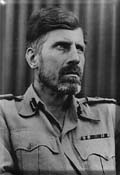With a background in exploration, guerilla fighting in Palestine and intelligence operations. He was sent by General Wavell (commanding in the Middle East) to Sudan in 1940 to help the Ethiopian nationalists and direct their revolt against the Italians. As the unrelenting leader of Gideon Force, he made use of bluff, maneuver and unorthodox tactics. Following the liberation of Ethopia, he was seriously ill and made an attempt at suicide, but after a convalescence he was called to India by Wavell, who appreciated his unconventional approaches.http://www.arlingtoncemetery.net/owingate.htm
For Burma, he proposed Long Range Penetration Groups to conduct guerilla operations behind the Japanese lines. A five-month test of this Chindit Concept in 1943 earned him a second bar to his Distinguished Service Order, though his losses in men and equipment were high. Churchill, ever delighted by imaginative fighters, took Wingate with him to the Quebec Conference in 1943. Although some opposed the idea, he went back to India with authorization to conduct long-range offensives under Lord Mountbatten, the Supreme Commander in Southeast Asia, as part of a campaign to recapture Burma.
In February 1944, his Chindits were dropped deep in Burma, but Wingate himself was killed in an aircrash in India in March. He was a controversial figure, an intense, mercurial man who loved to innovate and lead but who resented higher authority. He held a deep religious conviction that he was an instrument of a greater power, and he seemed infused with a mythical, almost fanatical quality. General Sir William Slim, who knew him both in Africa and in India, described him as "strange, excitable, moody creature, but he had a fire in him. He coul ignite other men."
He was one of nine men who died in the crash of a U.S. Army Air Corps transport plane in India on March 25, 1944. They were originally buried in India, but moved to a common grave in Section 12 of Arlington National Cemetery on November 10, 1950.
Here's more:

http://www.jewishvirtuallibrary.org/jsource/biography/wingate.html